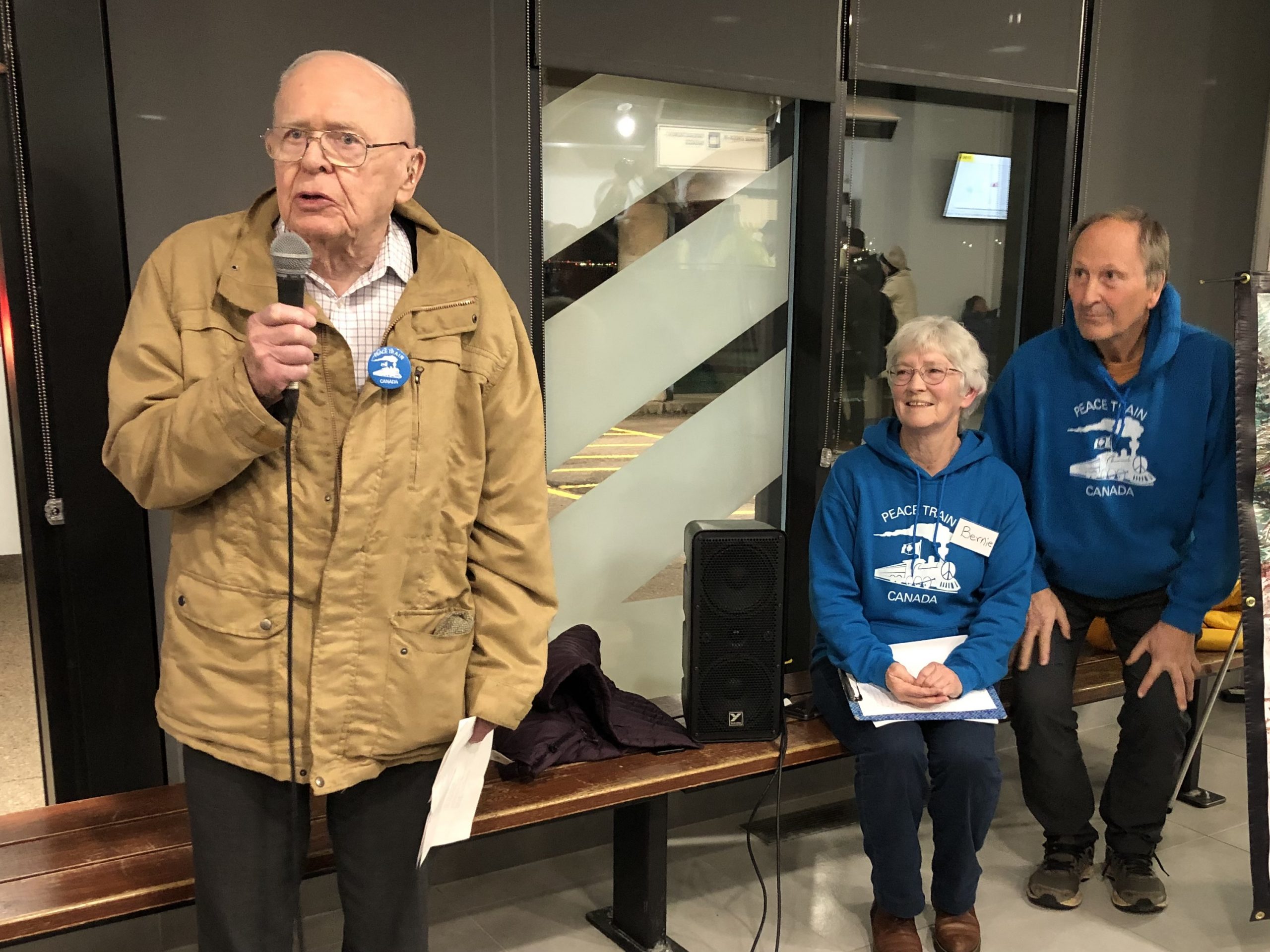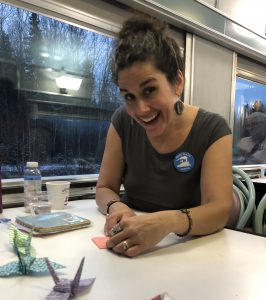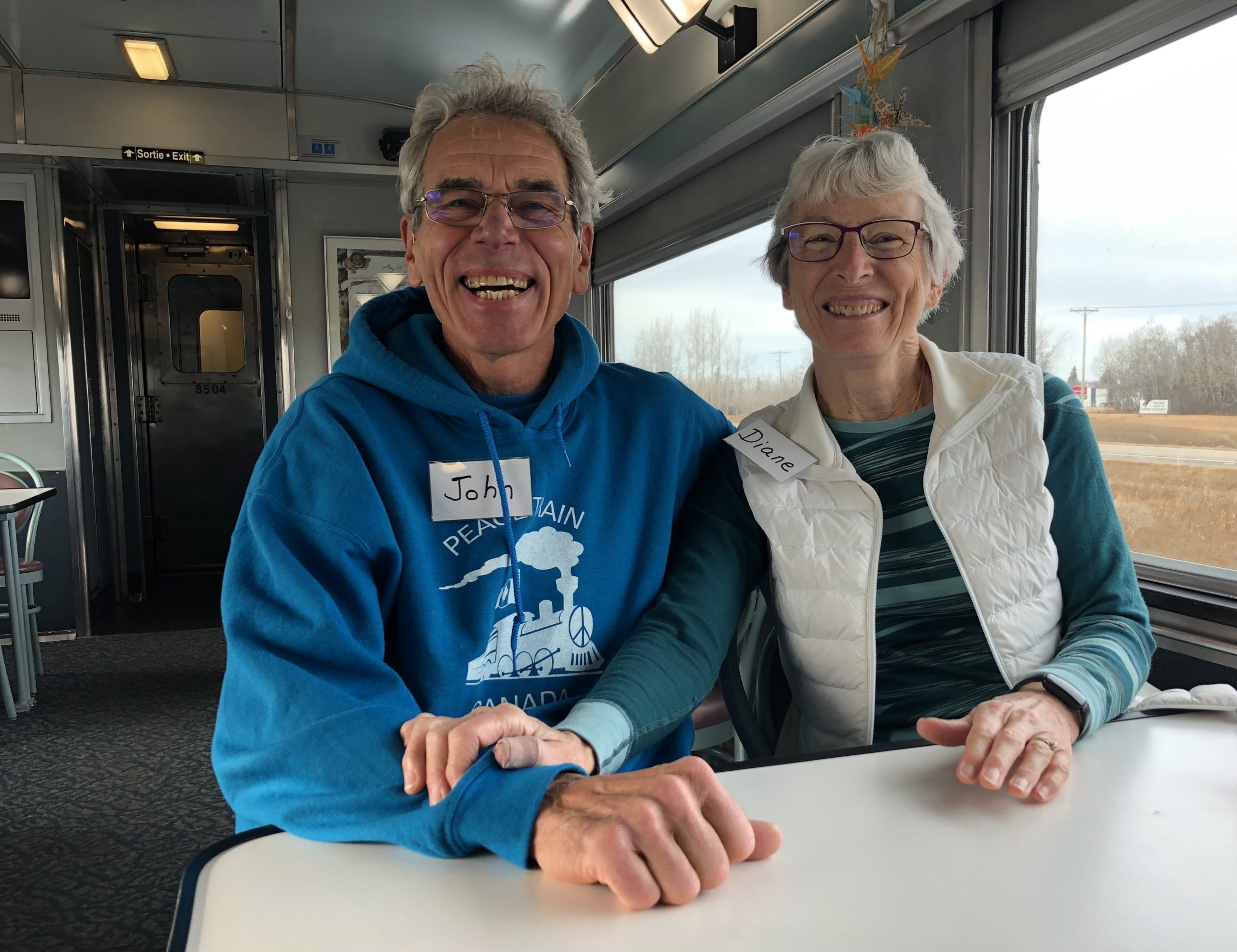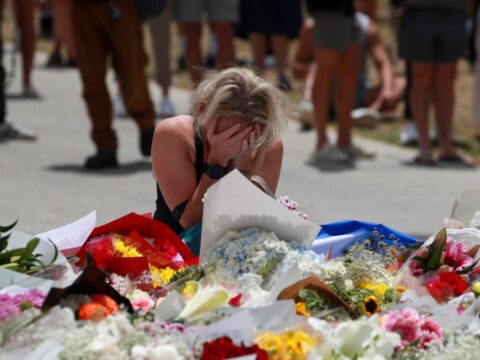Getting peace back on track in Canada is the goal for 40 Canadians travelling on the cross-country Peace Train.
The train, a dedicated passenger car on VIA Rail, departed Vancouver on Nov. 15 and will arrive in Ottawa on Nov. 20. Once there, participants will meet with members of Parliament to ask the federal government to allocate a portion of its military budget to establish and fund a Centre of Excellence for Peace and Justice. The centre would focus on research, education and training in conflict resolution, diplomacy and peace operations.
You may unsubscribe from any of our newsletters at any time.
Reporter John Longhurst asked participants aboard the train what peace means to them, and how Canada can contribute to a more just world.

During its stop in Edmonton, Douglas Roche, a former Canadian senator, parliamentarian, and diplomat, addressed participants, saying, “We need to find a new way to stop militarism. We need new diplomatic initiatives for peace.”
Roche highlighted the criticism Canada has faced as a NATO member for not spending enough on its military. “That’s a myth,” he said, noting that Canada is currently the seventh-largest spender on defence within NATO.
He also pointed to the election of Donald Trump as a sign that Canada may face increased pressure to boost its military spending. However, Roche argued that funds would be better allocated to housing, education, and healthcare at home. “That’s where Canadians want their tax dollars to go,” he said.

For Winnipeggers Gordon and Lori Matties, Val Falk, and Agnes Hubert, joining the Peace Train felt like a way to get Canada back on track.
Gordon Matties, who boarded the train in Vancouver, envisions “a future without war; a future of peace with justice for all of creation.”
Lori Matties shared, “More than ever, I believe we are all called to love our neighbours, and the only way to get rid of our enemies is to make them our friends.”
More on Broadview:
Val Falk hopes to see Canada reclaim the peacekeeping tradition she remembers from her childhood in the 1960s.
Agnes Hubert, drawing from her Anabaptist background, emphasized the importance of peacemaking and diplomacy as a role Canada could adopt in a more meaningful way. “I think it is a faithful interpretation of Jesus’ teachings,” she said.

Kristi Lewis of Cobble Hill, B.C. says joining the Peace Train was an easy decision—she knew right away she wanted to be part of it.
While aboard, Lewis has been documenting her experiences, leading singing sessions, and making paper cranes.
Although she admits to feeling heartbroken by the daily news, she believes in the power of resilience. “Despondency does not get us anywhere,” she said.
“I believe we must engage grief in order to move through it, and that loving community aids us in the process.”
For Deborah Walker, minister of connection and social justice at Shaughnessy Heights United Church in Vancouver, participating in the Peace Train is a way to demonstrate that the church is actively engaged in issues that matter to people.
This includes addressing challenges like global hunger and poverty, but she emphasizes that “peace is an overarching issue,” as war is a major driver of poverty and hunger, forcing people from their homes, work, and farms.
By joining the Peace Train, she hopes to convey a clear message: “The church has something to say about peace.”

Diane and John Mayba of Port Alberni, B.C., joined the Peace Train as a way to “turn our hopes and desire for peace into a concrete plan of action.”
Diane, 71, and John, 72, hope the Peace Train will inspire people across Canada to unite in bringing “a powerful voice for peace to Ottawa.”
The retired couple views war as “the ultimate injustice,” often misperceived as a solution rather than the catastrophic failure it truly is.
They believe Canada has a vital role to play in fostering a global system of true security.
For the Cathy and Sameer Merchant of Vancouver, getting peace back on track in Canada is a family affair. The couple joined the Peace Train with their children, Inara, 10, and Ammar, 7, and Cathy’s father, James.
Sameer said that traveling on the Peace Train as a family has enabled their children to learn more about how government works, and how “the actions of ordinary people can make a difference.”
At the end of the journey, Gord Johns, NDP member of parliament for Courtenay—Alberni, welcomed Peace Train participants at a reception in Ottawa at the Sir John A. MacDonald Building. Eleven other members of parliament attended.
Johns praised the Peace Trainers for bringing an important message to Ottawa by advocating for a Centre of Excellence for Peace and Justice — an initiative he expressed strong support for.
John McKay is the Liberal Member of Parliament for Scarborough—Guildwood and Chair of the Standing Committee on National Defence.
“We are all on the same train for peace,” he said. “We need your guidance and wisdom . . . I hope you come back again and again and again with your important message.”
***
John Longhurst is a writer based in Winnipeg.














World peace is a noble aspiration and if it could ever become a reality I’d be all for it. But there is a sad reality that as a species we are, what I call, a tribal lot. We seek to protect our own kind and anyone from the outside is viewed with suspicion. In the natural world, various species stick together in herds or flocks or schools. And, for the most part they seem to get along peacefully with each knowing his/her place. With humans, it’s different. Humans divide themselves by borders, by income, by education, by language and religion and by greed, custom, culture, skin colour and more. Humans, apparently by nature divide themselves into groups and unlike animals, humans are driven by greed, pride, lust and similar negative attributes. In order to have peace we must deal with one another as reasonable people but as we know, humans are not reasonable. That’s why we have police, soldiers, laws, prisons and such. We are not reasonable. We are controlled by pride, desire, the need to be better than the other. …. I believe that to have peace we must be ready for conflict. If we are not, there will be those who will seek to take advantage of us. There are many who think that being peaceful is a sign of weakness and they will try to take advantage of that. I feel we need a strong well trained military that, hopefully, we will never have to use. Despots and dictators fear those who are strong. We can live peacefully but we must be prepared for war.